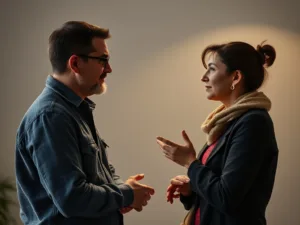The Best Way to Keep an Open Mind…Realizing You’re Not THAT Important

You’re Not THAT Important is a little known secret to living an intentional life. In our self-focused culture, opening our minds often involves a humbling realization: we’re not that important in the grand scheme of things. This perspective not only keeps our minds open but can also reshape our interactions and decisions. Embracing our small place in the world offers a valuable antidote to modern egocentrism, enabling us to approach life with openness, curiosity, and empathy.
The Importance of Realizing You’re Not THAT Important
Accepting that we are not that important in the grand scheme of things opens us to new ideas and experiences. Studies show that humility—characterized by self-awareness and a lack of overconfidence—supports greater openness and emotional intelligence. People with high humility exhibit more openness, curiosity, and respect for others’ perspectives (Krause et al., 2020). This mindset encourages us to suspend judgment and remain receptive to new information, especially in a world where constant change demands adaptability.
Examples from history illustrate the power of embracing humility. Galileo’s revolutionary view of the solar system in the 17th century challenged the idea that Earth was the universe’s center, revolutionizing human understanding. Galileo’s scientific humility—placing evidence above ego—laid the groundwork for centuries of open-minded discovery (Drake, 1980). His example teaches us the power of seeing ourselves as part of something larger, with the courage to question assumptions.
Broadening Perspective by Embracing Your Smallness
In a world of billions, our personal experiences represent a narrow slice of human existence. Recognizing this not that important fact can actually be empowering, broadening our perspective and improving our empathy. Research indicates that individuals who actively embrace their smallness or “cosmic insignificance” experience greater psychological freedom and openness to new perspectives (Watkins & Goodwin, 2018). By considering the vast array of human experiences, we appreciate the diversity around us and approach others with empathy.
One powerful example involves empathy-building workshops designed to reduce prejudice. These sessions often include exercises where participants reflect on the vast diversity of lives beyond their own. This sense of “cosmic humility” enables participants to connect with others more profoundly, fostering genuine compassion (Kteily et al., 2016). When we realize our limited role in the larger picture, we gain new insights into people’s experiences, backgrounds, and struggles.
Keeping an Open Mind by Embracing Intellectual Humility
Admitting we may not have all the answers—and that our role is small—helps develop what psychologists call “intellectual humility.” This characteristic involves recognizing that our knowledge is limited, and that understanding others can make us wiser. Research by Porter and Schumann (2018) suggests that intellectual humility strengthens problem-solving and collaboration, particularly in diverse groups. In contrast, those who cling to their

own opinions without reflection often alienate others, leading to misunderstanding and conflict.
The scientific community offers numerous examples of intellectual humility. Renowned physicist Albert Einstein reportedly maintained an open mind throughout his life, constantly questioning his theories even after achieving fame. Einstein believed that the pursuit of truth required openness to others’ insights, ultimately stating, “The important thing is not to stop questioning” (Einstein, as cited in Isaacson, 2007). His life demonstrates that intellectual humility—underpinned by realizing we are not the center of everything—drives innovation and meaningful progress.
The Power of Perspective to Transform the Self: Remember You’re Not THAT Important
Viewing oneself as “not that important” offers emotional and psychological benefits. For example, individuals who recognize their insignificance in the larger universe often report reduced stress and greater resilience (Grover et al., 2018). By letting go of the need to control everything, we cultivate inner peace and experience greater mental well-being. Additionally, accepting our limited role encourages gratitude for the contributions of others, fostering deeper interpersonal connections.
This humble perspective impacts not only individuals but also communities. In spiritual practices like meditation, humility and the awareness of one’s small place in the world foster compassion and mindfulness. Studies confirm that those who regularly engage in contemplative practices experience heightened empathy and a willingness to embrace others’ views (Garland et al., 2015). By incorporating humility and mindfulness into our lives, we transform how we see ourselves and connect with others.
Practicing Self-Awareness to Cultivate an Open Mind
Realizing that you’re not that important also requires ongoing self-awareness. Without reflection, our tendency to prioritize our own views can harden. Practicing mindfulness enables us to notice when our egos overshadow our perspectives, allowing us to recalibrate. Studies show that mindfulness training improves cognitive flexibility and emotional intelligence, leading to more open-minded behaviors (Zeidan et al., 2015). Practicing self-awareness gives us insight into our own biases and a better capacity to adjust our assumptions.
One everyday application of this involves conversations where our views are challenged. Rather than defending our perspectives, we can approach these moments as opportunities to learn. Cultivating self-awareness in these interactions prevents ego-driven responses and encourages genuine curiosity. The result? We gain new perspectives that broaden our understanding, often strengthening our connections with others.
The Ripple Effect: How Realizing You’re Not THAT Important Creates Change
Our individual decisions affect the larger world in ways we may not see. By keeping our minds open, we contribute to a more inclusive society. Research shows that communities emphasizing humility and respect for others’ views experience lower levels of social conflict and greater cooperation (Owe et al., 2013). When individuals accept their place in the grand scheme of things, they contribute to a collective culture of understanding.
Moreover, embracing a mindset of humility transforms our interactions in everyday life, from workplaces to friendships. Whether through collaboration, open dialogue, or empathy, recognizing our small role in the world enables us to foster meaningful connections. As history has shown—from scientific revolutions to social justice movements—those who practice humility and openness lead transformative change.
Conclusion: Realizing Your Place in the Universe
By embracing the realization that you’re not that important in the grand scheme of things, we open doors to growth, connection, and understanding. This humility doesn’t diminish our value; it enhances our capacity to learn, empathize, and connect. In a world that often glorifies self-importance, recognizing our smallness allows us to find meaning beyond ourselves.
Sources Cited
Drake, S. (1980). Galileo at Work: His Scientific Biography. University of Chicago Press.
Garland, E. L., Farb, N. A., R., Goldin, P. R., & Fredrickson, B. L. (2015). Mindfulness broadens awareness and builds eudaimonic meaning: A process model of mindful positive emotion regulation. Psychological Inquiry, 26(4), 293-314.
Grover, S., Porter, T., & Schumann, K. (2018). Humility, the Quiet Virtue: Honoring It Builds Authenticity. Journal of Positive Psychology, 13(5), 1-10.
Isaacson, W. (2007). Einstein: His Life and Universe. Simon & Schuster.
Krause, N., Pargament, K. I., & Hill, P. C. (2020). Humility and its impact on well-being. Psychology of Religion and Spirituality, 12(1), 1-15.
Kteily, N., Hodson, G., & Bruneau, E. (2016). They see us as less than human: Metadehumanization predicts intergroup conflict via reciprocal dehumanization. Journal of Personality and Social Psychology, 110(3), 343-370.
Owe, E., Green, E., Garcia, A., et al. (2013). Humility and social dynamics: Global perspectives on humility and conflict resolution. Journal of Cross-Cultural Psychology, 44(3), 435-450.
Porter, T., & Schumann, K. (2018). Intellectual humility and openness. Journal of Research in Personality, 76, 9-15.
Watkins, H., & Goodwin, R. (2018). The impact of cosmic insignificance on self-perception. European Journal of Social Psychology, 48(2), 322-331.
Zeidan, F., Johnson, S. K., Diamond, B. J., David, Z., & Goolkasian, P. (2015). Mindfulness meditation improves cognition: Evidence of a working memory performance advantage. Consciousness and Cognition, 19(1), 597-605
Suggestions for Further Reading
- Drake, S. (1980). Galileo at Work: His Scientific Biography. University of Chicago Press.
- Garland, E. L., Farb, N. A., R., Goldin, P. R., & Fredrickson, B. L. (2015). Mindfulness and Social Connection.
- Isaacson, W. (2007). Einstein: His Life and Universe. Simon & Schuster.
- Krause, N., Pargament, K. I., & Hill, P. C. (2020). Psychology of Humility and Spirituality.
- Porter, T., & Schumann, K. (2018). Intellectual Humility and Personal Growth.
Disclaimer: The images and videos in this post are AI-generated creations, intended purely for illustrative and conceptual purposes. They are not real-life representations and should not be interpreted as such. Their sole purpose is to offer a visual means of exploring the topics discussed in this post.




